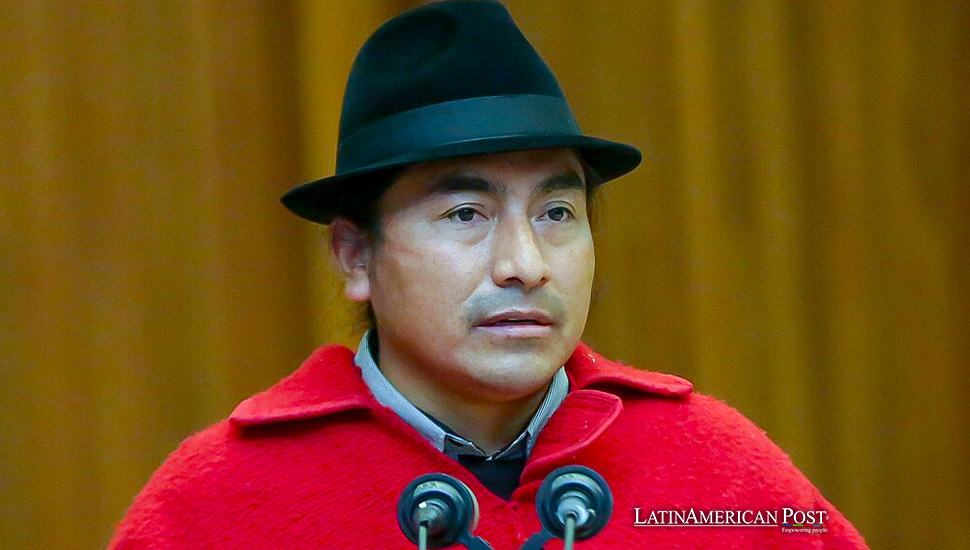Ecuador’s Political Chessboard in Race for the Presidency

As Ecuador approaches its presidential elections on February 9, 2024, the announcement of Leonidas Iza as the candidate for the Pachakutik movement highlights the intensifying competition among a dozen potential contenders. The final candidate list will be confirmed after the official registration concludes in October.
With the official announcement that Leonidas Iza will be the presidential candidate for the Pachakutik movement, Ecuador’s indigenous political arm has solidified its presence in the upcoming 2024 elections. Iza, the influential president of the Confederation of Indigenous Nationalities of Ecuador (Conaie), is set to run with Katiuscka Molina, a young professional from the coastal province of Manabí, as his vice-presidential candidate. This move comes after a primary process within Pachakutik that culminated in Iza’s nomination, underscoring the movement’s determination to place Indigenous issues at the forefront of national politics.
Iza’s candidacy symbolizes a broader political strategy by Ecuador’s leftist and progressive groups to consolidate their power. On the upcoming Friday, Pachakutik, the Ecuadorian Socialist Party, the Citizen Revolution Movement (RC) led by former President Rafael Correa, the RETO group, and the Democratic Center will potentially meet to form a unified front. This coalition aims to develop a joint government plan that could shape Ecuador’s future, depending on the success of these efforts to unite various factions under a shared banner.
The influence of Pachakutik in Ecuadorian politics has grown significantly since its inception in 1995 as the political arm of the indigenous movement. Initially focused on advocating for indigenous rights, the movement has expanded its platform to address broader socio-economic issues, becoming a key player in the nation’s political landscape. Iza’s leadership has been marked by his role in organizing large-scale protests against government policies, particularly those seen as detrimental to indigenous communities. His candidacy represents a continuation of this activism on a national stage, aiming to address issues such as land rights, environmental protection, and social justice.
The Many Faces of Ecuador’s Election
As Leonidas Iza joins the race, the list of potential candidates for Ecuador’s presidency has swelled to a dozen. Among these contenders is the current president, Daniel Noboa, who has expressed his intention to run for re-election under the banner of the National Democratic Action (ADN) movement. Noboa, who assumed office in November 2023 after winning a snap election, aims to secure a full four-year term. However, his campaign faces a significant challenge due to an electoral complaint filed by his vice president, Verónica Abad, accusing him of “political gender violence.”
Noboa’s candidacy is not without controversy. He was elected to complete the 2021-2025 term after former President Guillermo Lasso invoked the constitutional mechanism known as “cross death,” which allowed him to dissolve the National Assembly and call for early elections. This maneuver, intended to prevent his impeachment over corruption allegations, led to a volatile political environment that Noboa inherited. His presidency has since been marked by efforts to stabilize the country, but the upcoming election will test his ability to retain power amid ongoing political turbulence.
Among the other notable candidates is Luisa González, the representative of the Correísmo movement, who narrowly lost to Noboa in the previous election. This time, she is running with economist Diego Borja as her vice-presidential candidate, hoping to reclaim the presidency for her political faction. The Social Christian Party (PSC), a traditional power player in Ecuadorian politics, has put Henry Kronfle, the current head of the National Assembly, as its candidate, pairing him with legislator Dallyana Passailaigue.
In addition to these established figures, the election has drawn a diverse array of candidates from across the political spectrum. These include Iván Saquicela, a former president of the Supreme Court running for the Democracy Yes movement; Pedro Granja, the Socialist Party’s nominee; and Andrea González, who previously ran as vice-presidential candidate alongside Fernando Villavicencio, who was tragically assassinated during the 2023 campaign. The variety of candidates reflects the deep divisions within Ecuador’s political landscape, with each faction vying for a share of the electorate’s support.
Ecuador’s Evolving Electoral Landscape
Ecuador’s political environment has been shaped by decades of instability and transformation, with frequent shifts in leadership and ideology. The country’s history of electoral politics is marked by the rise and fall of various political movements, each seeking to redefine Ecuador’s future. From the 1960s and 1970s military dictatorships to the neoliberal reforms of the 1990s, Ecuador’s electoral landscape has continually evolved, reflecting broader regional trends in Latin America.
The 21st century saw the emergence of Rafael Correa’s Citizen Revolution, which dominated Ecuadorian politics for a decade. Significant economic and social reforms characterized Correa’s presidency (2007-2017), but also by increasing authoritarianism and allegations of corruption. The end of Correa’s term marked a turning point, as his successors struggled to maintain the momentum of his movement while addressing growing public dissatisfaction.
In recent years, Ecuador’s political landscape has become increasingly fragmented, with traditional parties losing ground to new movements and independent candidates. The “cross death” mechanism used by Lasso in 2023 was a dramatic reminder of the volatility of Ecuadorian politics, demonstrating how quickly power can shift in a country where institutional stability is often precarious. The upcoming 2024 election, therefore, is not just a contest for the presidency but a battle for the nation’s future direction, with the potential to reshape Ecuador’s political trajectory for years to come.
Strategies and Alliances in the Making
As the election date approaches, Ecuador’s political parties are engaged in a frantic race against time to finalize their candidates and strategies. The official registration period, from September 13 to October 3, will mark the finalization of the candidate list, but the jockeying for alliances and endorsements will continue well beyond that. For many candidates, the key to victory lies in building coalitions that appeal to a broad cross-section of Ecuador’s 13 million eligible voters.
For Leonidas Iza and Pachakutik, the focus will be on mobilizing the indigenous vote, which has historically been a powerful force in Ecuadorian politics. However, to win the presidency, Iza must broaden his appeal beyond his traditional base, reaching out to urban voters and other marginalized groups. His challenge will be to craft a message that resonates with a diverse electorate while maintaining the support of the indigenous communities that form the backbone of his movement.
On the other hand, Daniel Noboa faces the daunting task of defending his record as president while navigating the legal challenges posed by his vice president’s complaint. Noboa’s campaign will likely emphasize stability and continuity, positioning himself as a safe choice in a turbulent political environment. However, his ability to unite his party and fend off challenges within his ranks will be critical to his success.
For Luisa González and the Correísmo movement, the strategy will involve rallying the loyal base of supporters who remain devoted to Rafael Correa’s legacy. González must differentiate herself from her rivals by offering a compelling vision for Ecuador’s future that builds on Correa’s achievements while addressing the concerns of voters who may be wary of returning to the past.
Also read:Power Struggle in Ecuador Amid Election Uncertainty is a Threat to Democracy
As the candidates prepare for the official campaign period, the coming weeks will be filled with negotiations, public appearances, and the unveiling of policy platforms. Each candidate will seek a distinct identity, positioning themselves as the best choice to lead Ecuador through the challenges ahead. With so much at stake, the 2024 presidential election is shaping up to be one of the most consequential in Ecuador’s recent history, a contest that will determine not only the country’s leadership but its direction for years to come.





